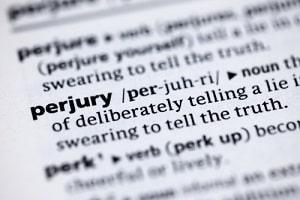Recent Blog Posts
What Is “Perjury” and How Can it Impact My Federal Criminal Case?

Being accused of any type of crime can be an unnerving experience. However, when the prosecuting party is the federal government, the situation is even more frightening. If you or a loved one has been charged with a crime relating to child trafficking, sexual exploitation of a child, money laundering, drug trafficking, weapons trafficking, or another federal offense, you may feel completely lost. The first step you should take is to hire an attorney experienced in defending against federal charges. Your attorney will help you avoid making mistakes that worsen your chances of being acquitted. One such mistake that can result in additional federal charges is lying under oath or perjury.
What Is “Entrapment” and How Can it Influence a Texas Criminal Case?

Entrapment occurs when a government official such as a police officer compels someone to commit a criminal offense. Some people falsely believe that police must always identify themselves as law enforcement officers. In reality, police are fully authorized to lie or use deceptive techniques to obtain evidence of a criminal act. However, police cannot use extreme behavior, threats, or coercion to force a normally law-abiding citizen to commit a criminal act. Entrapment is an “affirmative” defense against criminal charges in Texas, which means that the defendant is admitting that he or she committed the offense but is also presenting a justification for doing so.
What Is the Difference Between a Sting Operation and Entrapment?
If you have ever seen television shows such as To Catch a Predator, you may have wondered about the legality of police undercover stings. A sting operation is a law enforcement action intended to catch an individual committing a criminal offense. It typically involves an undercover police officer or detective posing as a potential victim or criminal partner in order to gather evidence that can be used during a criminal prosecution. However, if a police sting operation crosses the line into entrapment, evidence obtained during the operation may not be admissible in court. Sting operations are often used to catch individuals engaging in the purchase or sale of illicit drugs, solicitation of a minor, solicitation of a prostitute, or the possession or distribution of child pornography. The main difference between entrapment and a lawful sting operation is that a sting operation offers an individual the opportunity to commit a crime while entrapment involves the individual being coerced or persuaded into committing a crime.
Can I Face Criminal Charges for Leaving My Child in the Car in Texas?

For many parents, the way they raise their children is substantially different than the way that they were raised. Parents may assume that leaving their children in the car while they are shopping or otherwise engaged is not unsafe simply because they remember waiting in the car alone when they were a child. However, states are increasingly enacting legislation designed to prevent parents from leaving children unsupervised in vehicles. In 2019, 52 children passed away after being left in hot cars. In order to prevent these tragic deaths, Texas has made it illegal to leave children alone in vehicles under certain circumstances.
Leaving a Child in a Car May Be Considered a Criminal Offense
Texas is known for its extremely hot summers. Hot and humid weather makes the risk of a child developing heatstroke or dying in a hot car especially high. Many parents who leave their children in the car only intend to be gone for a few minutes, however, it only takes 10 minutes for an average car to heat up by 19 degrees. The Texas Department of State Health Services urges parents to teach children not to play inside of cars and to never leave a young child in a car unsupervised.
When Does Disciplining a Child Cross the Line into Abuse in Texas?

The way that parents raise their children is evolving with each new generation. One issue that has become especially controversial in recent years is corporal punishment or using physical force such as spanking as a form of discipline. Whatever your personal opinions are regarding corporal punishment, it is important to understand how Texas law differentiates between punishment and abuse. Individuals who physically punish children in a way that crosses the line into abuse can face criminal charges for domestic assault, injury to a child, and other crimes against children.
Definition of Family Violence According to the Texas Family Code
Texas law defines “family violence” as actions that are intended to result in bodily injury, physical harm, or assault. Abuse is defined in the Texas Family Code as:
What Types of Firearm Violations Can Result in Federal Charges?

The Second Amendment to the United States Constitution gives citizens the right to possess firearms. However, gun owners must also comply with a range of federal, state, and local laws regarding how and when firearms may be possessed and used. Many firearm violations are prosecuted by the federal government. Federal gun charges often carry much harsher penalties than state charges do. A person convicted of a federal firearm offense may be sentenced to years or decades of incarceration. If you have been accused of trafficking firearms across state lines, illegal possession or sale of a firearm, or other weapons violations, you need an experienced criminal defense lawyer who will fight to keep you out of prison.
Unlawful Acts Related to Firearms
The laws regulating the sale, transfer, possession, and use of firearms are mostly contained in 18 U.S. Code Chapter 44. Section 922 identifies firearm-related acts that are prohibited under federal law. These acts include but are not limited to:
What Actions Can Lead to Charges of Credit Card Fraud?
Credit card fraud and debit card fraud are forms of identity theft prohibited by both Texas law and federal law. There are many different types of actions that may lead to credit card fraud charges. A person may be charged with credit or debit card fraud for obtaining and using another person’s credit or debit card information, possessing devices or computer equipment used to steal card information, attempting to open an account with someone else’s personal information, and for many other acts. If you or a loved one have been accused of fraudulent use or theft of a credit card or debit card, this is considered a white-collar crime. Speak with a criminal defense attorney right away so that you can start building a strong defense against the charges.
Understanding Credit Card and Debit Card Fraud Laws
What Are the Penalties for a Sexual Teacher-Student Relationship in Texas?

School personnel often spend large amounts of time with students, and they may form special connections with certain individuals. However, teachers, coaches, guidance counselors, and other school staff have a legal responsibility to maintain proper boundaries with students. When a teacher-student relationship involves sexual contact, this constitutes a criminal offense in Texas. Although they are against the law, romantic or sexual student-teacher relationships do exist in Texas and throughout the United States. If you or someone you know has been accused of sexual contact with a student, it is crucial to consult a criminal defense attorney to obtain the legal guidance you need.
Texas Law Regarding Teacher-Student Relationships
According to the Texas Penal Code, it is illegal for any primary school or secondary school educator to engage in sexual activity with a student. This includes teachers as well as substitute teachers, teachers’ aides, librarians, principals, administrative staff, counselors, and other employees of public or private schools. It is important to note that although the age of consent is 17 in Texas, it is still unlawful for an educator to have sexual contact with a student who is older than 17. In addition, online solicitation of a student by an educator is classified as an unlawful student-teacher relationship.
Can I Be Charged with Kidnapping for Taking My Own Child in Texas?

If you are a parent, facing criminal charges for a crime against your child may be one of the last things you ever expect to happen to you. Kidnapping laws are intended to prevent children from being abducted and taken into dangerous situations. However, many people do not realize that a child’s biological parent can also be charged with kidnapping under some circumstances. A kidnapping charge can result in heavy fines, incarceration, and the loss of child custody privileges. If you have been accused of kidnapping your child, speak to a criminal defense attorney who is experienced in handling crimes against children as soon as possible.
Texas Laws Regarding Child Abduction
According to the Texas Penal Code, any individual who knowingly abducts another person can be charged with kidnapping. Although there is not an offense classified as “parental kidnapping” in Texas law, parents can and have been charged with kidnapping for “abducting” their own biological child. Texas law defines “abduct” as limiting a person’s freedom by holding him or her in a place where he or she is unlikely to be found or reducing the individual’s movement by the use or threat of force.
What Types of Weapons Violations Can Lead to Federal Charges?

The use of firearms and other weapons is strictly regulated at the local, state, and federal levels of government. Federal weapons violations often carry harsher penalties and longer jail sentences than state weapons charges. Legal penalties associated with a federal weapons charge will depend on whether the weapon was used during the commission of a crime, whether bodily harm or death was caused, the defendant’s criminal history, the type of weapon found in his or her possession, and other factors. Firearm violations and other weapons charges can lead to years or decades in prison, so it is crucial that you speak with a knowledgeable criminal defense attorney if you are facing any type of federal weapons charge.
Federal Weapons Violations
Federal law regulates who is permitted to own a firearm, the types of weapons that may be possessed or transported, the locations in which firearms may be lawfully discharged, and the maximum number of firearms and other weapons a person is allowed to own. Often, weapons charges are investigated by the federal government because they involve interstate transactions. Federal weapons charges may involve:
What Are Possession and Promotion of Child Pornography in Texas?
Crimes against children are penalized especially harshly in the United States. Not only can a child-related offense result in heavy fees and jail time, but the defendant may also be required to register as a sex offender. This means that his or her name, address, picture, and a description of the crimes he or she has been convicted of will appear on the Texas Public Sex Offender Registry. A conviction of possession or promotion of child pornography can result in considerable imprisonment as well as a lifetime of stigma. If you or someone you know has been charged with possession or promotion of child pornography, it is imperative that you contact a skilled criminal defense attorney as soon as possible so that you can start building a strong defense against the charges.



















